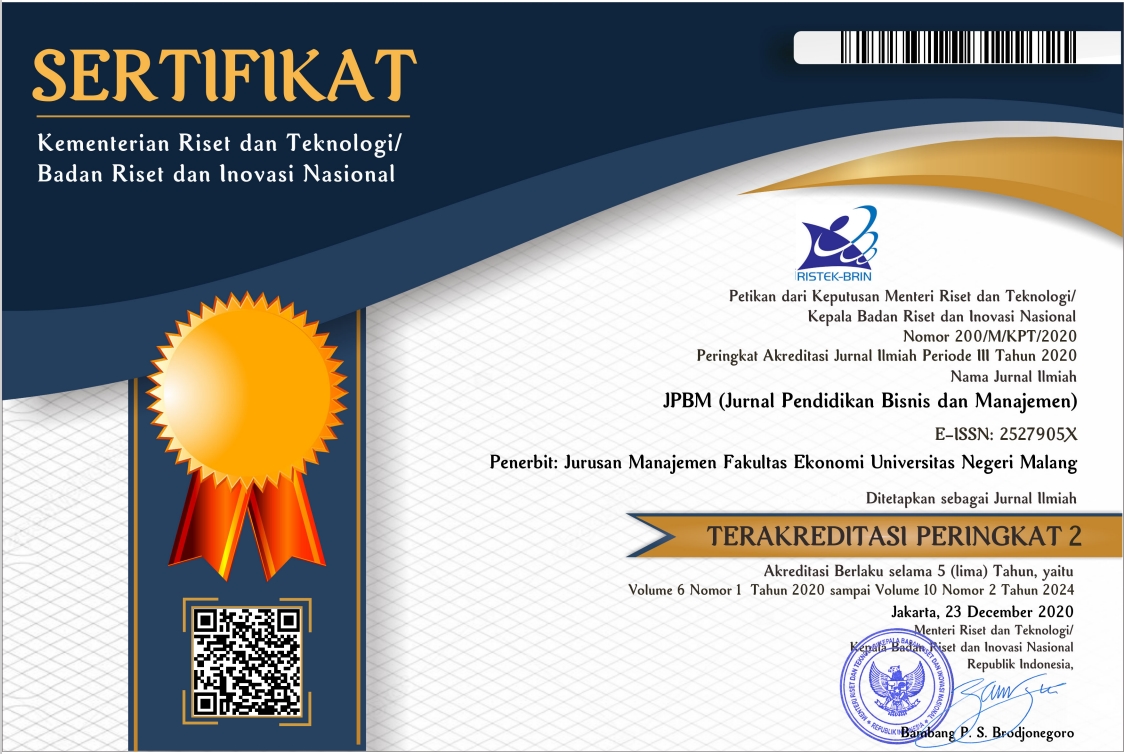Determinant Factors of Entrepreneurial Intention Among Students: A Systematic Literature Review
Abstract
Keywords: Entrepreneurial Intention, Self-Efficacy, Entrepreneurship Education, Family Environment, Motivation
Full Text:
PDFReferences
Abdullahi Ahmed, U., Asikha Aktar, M., & Sufian Abu Bakar, A. (2021). Graduate’s perception towards entrepreneurial career choice: Role of university and family. Ekonomi dan Bisnis, 5(2), 12.
Afiat, M. N., Rijal, S., Koesoemasari, D. S. P., Furqan, A. C., & Abdullah, M. I. (2023). Learning strategies in developing entrepreneurial intention among students: Theory of planned behavior approach. Jurnal Kependidikan: Jurnal Hasil Penelitian dan Kajian Kepustakaan di Bidang Pendidikan, Pengajaran dan Pembelajaran, 9(2), 659. https://doi.org/10.33394/jk.v9i2.7757
Akere, O. M., & Iwayemi, O. D. (2023). Graduates’ entrepreneurship programme: A proper framework for national economic development in Nigeria. American Journal of Education and Technology, 2(3), 16–19. https://doi.org/10.54536/ajet.v2i3.1537
Antončič, B., & Auer Antončič, J. (2023). Psychological and sociological determinants of entrepreneurial intentions and behaviors. Frontiers in Psychology, 14. https://doi.org/10.3389/fpsyg.2023.1076768
Ao, Y., Huang, J., & Liu, X. (2022). Physical environment research of the family ward for a healthy residential environment.
BPS. (2023a). Indeks pembangunan manusia (IPM) Indonesia tahun 2023 mencapai 74,39, meningkat 0,62 poin (0,84 persen) dibandingkan tahun sebelumnya (73,77). https://www.bps.go.id/
BPS. (2023b, November 6). Tingkat pengangguran terbuka (TPT) sebesar 5,32 persen dan Rata-rata upah buruh sebesar 3,18 juta rupiah per bulan. https://www.bps.go.id/
BPS. (2024, February). Ekonomi Indonesia Triwulan IV-2023 Tumbuh 5,04 Persen (y-on-y). https://www.bps.go.id/
Buschow, C., & Laugemann, R. (2020). What makes a media entrepreneur? Factors influencing entrepreneurial intention of mass communication students. Journalism and Mass Communication Educator, 75(3), 321–334. https://doi.org/10.1177/1077695820912146
Castellano, S., Maalaoui, A., Safraou, I., & Reymond, E. (2014). Linking intuition and entrepreneurial intention: a comparative study among French and US student entrepreneurs. International Journal of Entrepreneurship and Innovation Management (Vol. 18, Issue 1).
Contreras-Barraza, N., Espinosa-Cristia, J. F., Salazar-Sepulveda, G., & Vega-Muñoz, A. (2021). Entrepreneurial intention: A gender study in business and economics students from Chile. Sustainability (Switzerland), 13(9). https://doi.org/10.3390/su13094693
Deliana, M. (2023). Self-efficacy as a factor of entrepreneurial intention. Journal of Education, Humaniora and Social Sciences (JEHSS), 5(4), 2573–2580. https://doi.org/10.34007/jehss.v5i4.1758
Dodescu, A. O., Botezat, E. A., Constăngioară, A., & Pop-Cohuţ, I. C. (2021). A partial least-square mediation analysis of the contribution of cross-campus entrepreneurship education to students’ entrepreneurial intentions. Sustainability (Switzerland), 13(16). https://doi.org/10.3390/su13168697
Fanea-Ivanovici, M., & Baber, H. (2021). The role of entrepreneurial intentions, perceived risk and perceived trust in crowdfunding intentions. Engineering Economics, 32(5), 433–445. https://doi.org/10.5755/J01.EE.32.5.29300
Ferreira-Neto, M. N., de Carvalho Castro, J. L., de Sousa-Filho, J. M., & de Souza Lessa, B. (2023). The role of self-efficacy, entrepreneurial passion, and creativity in developing entrepreneurial intentions. Frontiers in Psychology, 14. https://doi.org/10.3389/fpsyg.2023.1134618
Georgescu, M. A., & Herman, E. (2020). The impact of the family background on students’ entrepreneurial intentions: An empirical analysis. Sustainability (Switzerland), 12(11). https://doi.org/10.3390/su12114775
Hanum, A. N. (2015). Pengaruh mata kuliah kewirausahaan terhadap minat mahasiswa menjadi wirausaha (Studi kasus pada Universitas Muhammadiyah Semarang).
Iancu, A., Popescu, L., & Popescu, V. (2021). Factors influencing social entrepreneurship intentions in Romania. Economic Research-Ekonomska Istrazivanja, 34(1), 1190–1201. https://doi.org/10.1080/1331677X.2020.1820358
James, J., Young, M., & Hua, L. (2023). Examining the entrepreneurial mindset and entrepreneurial intentions. In 30 Journal of Applied Business and Economics (Vol. 25, Issue 4).
Justice Malebana, M. (2021). The effect of entrepreneurial motivation on entrepreneurial intention of South African rural youth.
Kadarusman, Y. B. (2020). The impact of entrepreneurship on economic performance in Indonesia. Economics and Finance in Indonesia, 66(1), 1. https://doi.org/10.47291/efi.v66i1.684
Kaya, T., Erkut, B., & Thierbach, N. (2019). Entrepreneurial intentions of business and economics students in Germany and Cyprus: A cross-cultural comparison. Sustainability (Switzerland), 11(5). https://doi.org/10.3390/su11051437
Khamimah, W. (2021). Peran kewirausahaan dalam memajukan perekonomian Indonesia. Jurnal Disrupsi Bisnis, 4(3), 2017. https://doi.org/10.32493/drb.v4i3.9676
Lee, S., Kang, M. J., & Kim, B. K. (2022). Factors influencing entrepreneurial intention: Focusing on individuals’ knowledge exploration and exploitation activities. Journal of Open Innovation: Technology, Market, and Complexity, 8(3). https://doi.org/10.3390/joitmc8030165
Lin, S., De-Pablos-Heredero, C., Botella, J. L. M., & Lian, C. L. (2023). Influence of entrepreneurship education on the entrepreneurial intention of Chinese students enrolled at universities in the community of Madrid. IEEE Access, 11, 63678–63689. https://doi.org/10.1109/ACCESS.2023.3284970
López-Meri, A., Alonso-Muñoz, L., & Casero-Ripollés, A. (2021). What is behind the entrepreneurship intention in journalism? Entrepreneur typologies based on student perceptions. Journalism Practice, 15(3), 402–419. https://doi.org/10.1080/17512786.2020.1715821
Makina, Dr. J. K. (2022). Socio-cultural barriers to youth entrepreneurship in Africa: A study of young congolese graduates. International Journal of Management & Entrepreneurship Research, 4(2), 105–118. https://doi.org/10.51594/ijmer.v4i2.300
Manjarres Zambrano, N. V., Calle Cabezas, R. E., Escobar Medina, G. E., Carrera Salinas, K. J., & Gavilanes Gavilanes, W. F. (2023). Literature review on the family environment in school performance. Universidad Ciencia y Tecnología, 27(118), 69–76. https://doi.org/10.47460/uct.v27i118.688
Maran, T. K., Bachmann, A. K., Mohr, C., Ravet-Brown, T., Vogelauer, L., & Furtner, M. (2021). Motivational foundations of identifying and exploiting entrepreneurial opportunities. International Journal of Entrepreneurial Behaviour and Research, 27(4), 1054–1081. https://doi.org/10.1108/IJEBR-05-2020-0291
Mashudi, M., Rustam, R., Hidayah, R. Al, & sutandar, E. (2022). Entrepreneurship and work motivation training towards entrepreneurial interest in Arowana fish pond. International Journal of Scientific Advances, 3(1). https://doi.org/10.51542/ijscia.v3i1.8
Meng, D., Shang, Y., Zhang, X., & Li, Y. (2023). Does entrepreneurship policy encourage college graduates’ entrepreneurship behavior: The intermediary role based on entrepreneurship willingness. Sustainability (Switzerland), 15(12). https://doi.org/10.3390/su15129492
Mukhtar, S., Wardana, L. W., Wibowo, A., & Narmaditya, B. S. (2021). Does entrepreneurship education and culture promote students’ entrepreneurial intention? The mediating role of entrepreneurial mindset. Cogent Education, 8(1). https://doi.org/10.1080/2331186X.2021.1918849
Ntimbwa Manongi, C., & Chachage, B. (2023). Entrepreneurship factors influencing self-employment amongst graduates of institutions of higher education in Tanzania. The Uganda Higher Education Review, 10(2), 166–181. https://doi.org/10.58653/nche.v10i2.09
Nuraeni, Y., & Teguh Gunawan, B. (2023). Development of labor market information system in Indonesia towards world class. 53(1), 1–14. https://doi.org/10.21831/informasi.v53i1
Nursyirwan, V. I., Purwana, D., Suhud, U., Harahap, I. L. P., & Valentika, N. (2022). Entrepreneurial intention among students: The effect of self-efficacy and entrepreneurial attitude. Jurnal Pendidikan Ekonomi dan Bisnis (JPEB), 10(2), 193–205. https://doi.org/10.21009/jpeb.010.2.8
Purwanti, S., Handayani, P., & Kusdiyanti, H. (2024). The effect of entrepreneurship education and curriculum on student entrepreneurial intention moderated by student entrepreneurial mindset. Asian Journal of Agricultural Extension, Economics & Sociology, 42(5), 68–81. https://doi.org/10.9734/ajaees/2024/v42i52415
Qodariah, Q., & Arifin, Y. A. (2023). The influence of entrepreneurship knowledge, motivation and family environment on entrepreneurship interest. International Journal of Social Service and Research, 3(3), 818–825. https://doi.org/10.46799/ijssr.v3i3.293
Ramawati, Y., Sudiro, U., & Fatchur Rochman, I. (2020). Understanding entreprenuerial intention: A mediation effect of entreprenuerial motivation on perceived desirability to new venture creation intention. International Journal of Entrepreneurship (Vol. 24, Issue 3).
Rodriguez-Gutierrez, P., Cabeza-Ramírez, L. J., & Muñoz-Fernández, G. A. (2020). University students’ behaviour towards entrepreneurial intention in Ecuador: Testing for the influence of gender. International Journal of Environmental Research and Public Health, 17(22), 1–19. https://doi.org/10.3390/ijerph17228475
Saifullah Aldeia, A. (2018). Urgency of entrepreneurship education for millennial generation.
Salas T., S. A., Cruz-Tarrillo, J., Vásquez-Vásquez, J. E., Armas, E. T., García, Y. I. H., & Tarqui, E. E. A. (2024). Business education and entrepreneurial competence drivers of entrepreneurial intention in university students. Academic Journal of Interdisciplinary Studies, 13(4), 257. https://doi.org/10.36941/ajis-2024-0114
Sari, N., Maisyarah Batubara, H., Astuti, K., Anwar, K., Evanita, S., Negeri Padang, U., Hamka, J., Tawar Bar, A., Padang Utara, K., Padang, K., & Barat, S. (2023). Pengaruh entrepreneurial self efficiacy dan opportunity recognition terhadap entrepreneurial intention dengan entrepreneurialship education sebagai variabel moderating (Studi Kasus SMAN 1 Pantai Cermin). Journal on Education, 06(01), 6723–6735.
Sastri, H., Asriati, N., & Syahrudin, H. (2022). Pengaruh literasi ekonomi dan lingkungan sosial terhadap minat berwirausaha mahasiswa pendidikan ekonomi Fkip Untan. Jurnal Pendidikan dan Pembelajaran Khatulistiwa (JPPK), 11(7), 676. https://doi.org/10.26418/jppk.v11i7.56389
Shahzad, M. F., Khan, K. I., Saleem, S., & Rashid, T. (2021). What factors affect the entrepreneurial intention to start-ups? The role of entrepreneurial skills, propensity to take risks, and innovativeness in open business models. Journal of Open Innovation: Technology, Market, and Complexity, 7(3). https://doi.org/10.3390/JOITMC7030173
Skrbková, D., & Rydvalová, P. (2023). Entrepreneurial intentions: A comparative study of african and european university economics students. Journal of African Business. https://doi.org/10.1080/15228916.2023.2276541
Toto Handiman, U., Nur Affini, D., Faridi, A., Hidayat Sutawijaya, A. (2022). bagaimana subjective norms dan entrepreneurship education berpengaruh terhadap entrepreneurial intention mahasiswa? In Jurnal Doktor Manajemen (Vol. 5).
Turra, G. M. S., & Melinda, T. (2021). Personal attitude, subjective norm, and perceived behavioral control: Differentiating factors of entrepreneurial intention of high school students who are joining and not joining the entrepreneurship education in an international school. KnE Social Sciences. https://doi.org/10.18502/kss.v5i5.8823
Vasilescu, M. D., Dimian, G. C., & Gradinaru, G. I. (2023). Green entrepreneurship in challenging times: A quantitative approach for European countries. Economic Research-Ekonomska Istrazivanja, 36(1), 1828–1847. https://doi.org/10.1080/1331677X.2022.2093767
Wardana, L. W., Martha, J. A., Wati, A. P., Narmaditya, B. S., Setyawati, A., Maula, F. I., Mahendra, A. M., & Suparno. (2024). Does entrepreneurial self-efficacy really matter for entrepreneurial intention? Lesson from covid-19. Cogent Education, 11(1). https://doi.org/10.1080/2331186X.2024.2317231
Wąsowska, A. (2016). Who doesn’t want to be an entrepreneur? The role of need for closure in forming entrepreneurial intentions of polish students. Entrepreneurial Business and Economics Review, 4(3), 27–39. https://doi.org/10.15678/EBER.2016.040303
Ye, C., Ma’rof, A. A., Abdullah, H., Hamsan, H. H., Zhang, L., & We, Q. (2022). Research status and development trend of the theory of planned behavior: A visual analysis based between 2012-2022. International Journal of Academic Research in Business and Social Sciences, 12(12). https://doi.org/10.6007/ijarbss/v12-i12/15747
Zhang, J., Li, B., Zhang, Y., Gong, C., & Liu, Z. (2022). From entrepreneurship education, government support, and global competence to entrepreneurial behavior: The serial double mediating effect of the self-efficacy and entrepreneurial intention. Frontiers in Psychology, 13. https://doi.org/10.3389/fpsyg.2022.838232
DOI: http://dx.doi.org/10.17977/um003v11i12025p033
Refbacks
- There are currently no refbacks.
JPBM (Jurnal Pendidikan dan Bisnis Manajemen) is licensed under a Creative Commons Attribution-NonCommercial-ShareAlike 4.0 International License.
JPBM (Jurnal Pendidikan dan Bisnis Manajemen) is abstracted and indexed in :
















